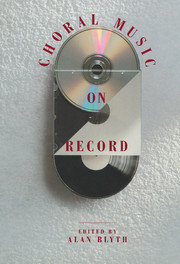Book contents
- Frontmatter
- Contents
- Preface
- Monteverdi: Vespers (1610)
- J.S. Bach: St John Passion
- J.S. Bach: St Matthew Passion
- J.S. Bach: Mass in B Minor
- Handel: Messiah
- Mozart: Requiem Mass
- Haydn: The Creation
- Haydn: The Seasons
- Beethoven: Missa Solemnis
- Mendelssohn: Elijah
- Rossini: Stabat mater Petite messe solennelle
- Berlioz: Grande Messe des Morts Te Deum L'Enfance du Christ
- Verdi: Requiem Mass
- Brahms: A German Requiem
- Fauré: Requiem
- Elgar: The Dream of Gerontius
- Walton: Belshazzar's Feast, Tippett: A Child of Our Time, Britten: War Requiem
- Stravinsky: The Wedding Symphony of Psalms
- Janáček: Glagolitic Mass
- Discographies
- Index
Haydn: The Creation
Published online by Cambridge University Press: 02 December 2009
- Frontmatter
- Contents
- Preface
- Monteverdi: Vespers (1610)
- J.S. Bach: St John Passion
- J.S. Bach: St Matthew Passion
- J.S. Bach: Mass in B Minor
- Handel: Messiah
- Mozart: Requiem Mass
- Haydn: The Creation
- Haydn: The Seasons
- Beethoven: Missa Solemnis
- Mendelssohn: Elijah
- Rossini: Stabat mater Petite messe solennelle
- Berlioz: Grande Messe des Morts Te Deum L'Enfance du Christ
- Verdi: Requiem Mass
- Brahms: A German Requiem
- Fauré: Requiem
- Elgar: The Dream of Gerontius
- Walton: Belshazzar's Feast, Tippett: A Child of Our Time, Britten: War Requiem
- Stravinsky: The Wedding Symphony of Psalms
- Janáček: Glagolitic Mass
- Discographies
- Index
Summary
The Creation tends to bring out the very best in musicians, as innumerable performances by amateur and semi-professional bodies each year make clear – they rise to the challenge and indeed surpass themselves in the service of an inexhaustibly delightful work. Doubtless part of its continuing hold on the imagination of people in an age of materialism, selfishness and little faith lies in the firm trust in God that inspired Haydn throughout his life – variants of ‘In nomine Domini’ and ‘Fine laus Deo’ preface and conclude most of his autograph scores. ‘I was never so pious as during the time when I was working on the Schöpfung’ he told his biographer Griesinger, ‘daily I fell on my knees and asked God that He grant me the strength to bring this work to a successful conclusion.’ This simple faith is nowadays more to be envied than taken for granted; the appeal of the oratorio lies at least in part in that blend of confidence and humility that inspired the composer during his lengthy labours (1796–8), and then in the direction of the performance (‘Now I was ice-cold all over, now a hot glow came over me, and more than once I feared I should have a stroke’). This confidence is something that we can briefly share, as performers or listeners, every time the work is given.
Haydn was sixty-five when he wrote The Creation, the most loved and most famous musician the world had yet known. The distant models for his oratorio were the great Handel choral and orchestral works whose inflatedly large-scale performances deeply impressed him during his first visit to London.
- Type
- Chapter
- Information
- Choral Music on Record , pp. 114 - 131Publisher: Cambridge University PressPrint publication year: 1991



